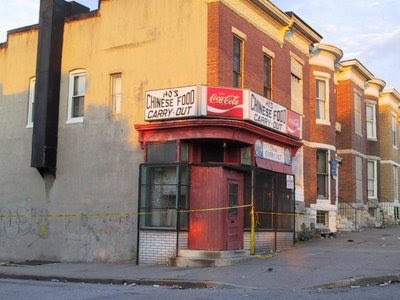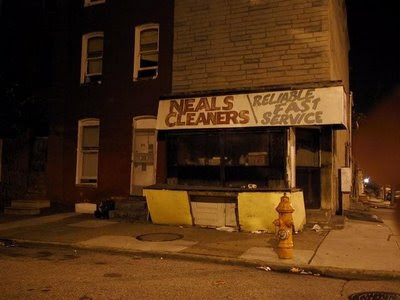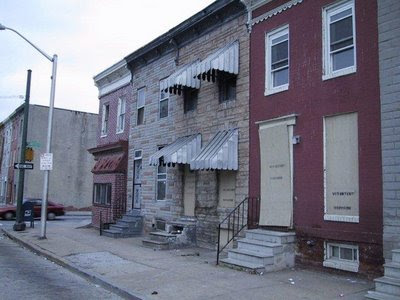A liquor store in Baltimore is being forced to close because a man was killed there and drug dealers congregate. Here’s the story in the Sun. I’m of mixed feelings. Liquor stores in the ghetto are hardly the most sympathetic businesses. But if they were all shut down, it’s not like the neighborhood’s problems would suddenly disappear.
It’s a shame there aren’t more locally run business in the ghetto. In many ways, the Eastern District is typical. Here’s a quick, perhaps inaccurate, and certainly unpolitically correct history of business life in the Eastern.
In the old days, or so I hear, many of the local businesses were run by Jewish people. At least that’s how the story is told on the street. Were they exploitive? Some think so. But, no, I don’t. Are all businesses exploitative? I don’t think so. Many of these Jews had grownup in the neighborhood. Many had stayed in the neighborhood when other whites fled. Yes, they were there to make money. But they also spoke English and hired locals to work in their stores. In hindsight, these were the good old days.
After the riots in the late 1960s, many of these store owners felt betrayed by the anger, left broke by the destruction, and realized that a little profit wasn’t worth their life. A lot of businesses packed up or closed for good.
Over the next 30 years, more businesses closed. And not an insignificant number of these after the owner got killed in a robbery.
Today there’s not much left. Monument St is still filled with stores. And there’s a excellent (black owned) produce store that deserves special mention (Leon’s Produce, 1001 N. Washington St.).
Other stores include laundromats, bars, Chinese takeout (called “yakamee” in Baltimore), and corner stores. The corner stores are now mostly run by Koreans (who are still referred to as “Chinamen”). If the store owners can’t afford a home in the suburbs, they may they live upstairs, in sort of a castle-like fortress setup.

I can see the causes for resentment on both sides. At it’s worst, think L.A. riots and Koreans guarding their stores with guns. The store owners sit all day behind plexiglas selling overpriced crap. Many don’t speak English. Most hate their customers. And because they’re behind glass and won’t come out, they can’t control what goes on in the lobby of their own store. And unlike the old days, these store owners, by and large, couldn’t care less about the well being of the neighborhood. Still, and this is important to remember, the bigger problem in the neighborhood is too few stores, not bad store owners. Besides it’s not easy to run a business in the ghetto. That’s why so few people do it. I wouldn’t. If running a store in the ghetto were such an easy way to make money, why don’t you do it?
Now I don’t know Mr. Yim, the owner of the closed liquor store. But my guess is 1) he felt helpless to control what went on in and around his store, 2) he was helpless to control what went on in and around his store, and 3) he didn’t really care as long as his 1,000 daily customers kept giving him money so he and his family could survive.
From the story: “More than 300 residents signed a petition in the spring asking the city liquor board not to renew the store’s license…. “With those doors locked, [the drug dealers] don’t have a place to hide anymore.”
But here’s the problem: with the doors locked, the drug dealers will still have places to hide. Drug dealers don’t want stores. Business owners are a pain in their ass. Business don’t want drug dealers scaring customers. Businesses call police… until eventually the business owner wins gives up.
For drug dealers, a vacant building is better for business than a store. Vacants don’t attract who don’t want to buy drugs. Vacants don’t call police. Vacants are good places to hide your stash. You can run away from police through a vacant. You can fuck your girl in a vacant. Every time a store closes, the drug dealers win. And by and large, the drug dealers have won a lot.

I was friends with a local man man who ran a corner laundromat. From behind the glass we’d drink coffee and talk about politics and race and I’d chuckle at the junkies who came in and paid 50 cents for a cup of sugar with a little coffee. The owner believed he was doing good. He was. If he closed, how would the old people on the block do their laundry? He was right. He also closed around 2pm because it was too dangerous after that.

His corner was a bad drug corner. The worst we had in Sector 2. And that’s saying a lot. For a while he called police because of drug dealing on his corner. When police pulled up, the dealers would run into his store (and cause trouble). After a while, police became convinced that he was a drug dealer. Because whenever police pulled up, there were drug dealers in his store. There’s a certain logic to that, except it’s wrong.
As much as I can guarantee anything, I can guarantee that this man was not dealing drugs. But what was he to do? He stopped calling police and continued to yell at dealers when they came in his store. There’s nothing the dealers would have liked more than him closing for good. And that’s why it’s sad whenever a business closes. The bad guys have won.
Sad indeed. In the past, I have advocated that people in ghettos work together to run cooperatives (employee and/or customer owned)to provide goods and services to their neighbors. Since many potential business owners are justifiably hesitant to open up shop in these areas–my retired police officer father once referred to a small shop near one of my city’s housing projects as the “Shop and Rob”–I felt that community involvement might be needed. Also, I thought that local thugs might be less inclined to bother these businesses if they were “community owned.” Well, I was probably naive. And the small shops that do open up go under pretty quickly.
These neighborhoods are unable to support any businesses that aren’t connected to the underground economy. The dominance of the public drug markets promote a parasitic environment that thrives on blight. So when progressives piss and moan about Wal Mart in the ghetto or McDonald’s in the ghetto, I just wince. Let’s protect the poor from Big Macs! This is paternalistic BS, in my opinion. I mean, where the fuck are people in these neighborhoods supposed to shop, eat, etc.. Protest against box stores seems to be a luxury enjoyed by well-to-do lefties and has little to do w/ improving life in the ghetto.
My very first arrest was in the Stop Shop and Save grocery store. You can imagine how easily becomes known as the “shop and rob.”
I’m more cynical than you when it comes to community owned. Yes, some people may respect that. But the people who respect aren’t robbing stores. Maybe “black owned” helped during the riots in the 1960s, but I don’t think it helps today. I handled too many calls for people breaking into churches to steal shit to make me think that anything is off limits.
Now this is more urban planning that police theory, but I think the problem with the big box stores is that they doom the neighborhood to a perpetual 2nd-class status.
Cities need more paternalistic progressives, because ain’t nobody else helping cities. Paternalistic progressives are the kind of people who gentrify neighborhoods and help the tax base. They want character. Not parking lots. And they won’t move into a neighborhood filled with big box stores and parking lots.
Yes, neighborhoods need shopping. And they also need drug treatment. And parking lots and methadone clinics may do some good, but eventually both will hold the neighborhood back.
I think neighborhoods *can* support businesses. But only if people from outside the neighborhood are willing to shop in the neighborhood. And only if the people who run the businesses can do so without getting killed.
Preventing crime helps the economy. I think even more so than vice versa.
Actually, my belief in the viability of community co-ops faded about the time I stopped calling myself a democratic socialist (not too long ago, actually). Truthfully, some of my ranting about “paternalistic progressives” could be directed at the way I was just a year or two ago. I’m still not a big fan of box stores or fast food, per se, but I find actions like L.A.’s recent attempt at banning fast food restaurants in South L.A. to be kind of silly. That’s what I was referencing when I made the crack about protecting poor people from Big Macs (incidentally, if McDonald’s opted to keep the “I’d hit that” slogan you spoke about recently, I’d give them business for a while to reward them for their edginess).
BTW, excellent point there at the end of your post. The Left has no problem pointing out that poverty is a cause of crime. And they shouldn’t, because it is readily apparent. Crime mapping could graphically demonstrate the correlation between low-income areas and high crime rates. This concept is probably uncontroversial unless you’re a “ditto head.” It’s probably less obvious to progressives that high crime also causes poverty, so it was good for you to point that out.